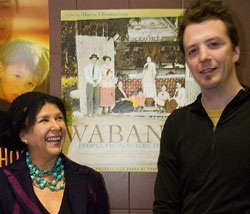Alanis Obomsawin: 40 years of change

Documentarist Alanis Obomsawin with Cinema Politica organizer Ezra Winton during a retrospective of her work on March 16 at the J.A. DeSève Cinema.
Rob Maguire
A member of the Order of Canada, Alanis Obomsawin has been making films with the National Film Board for close to 40 years. Her latest documentary, Waban-aki: People From Where the Sun Rises, was screened at Concordia on March 16 as part of a retrospective of her work.
“Her films are powerful, insightful, compelling testimonies of things that happen in our aboriginal communities,” said communications studies professor and co-curator of the event Yasmin Jiwani. She uses Obomsawin’s work in all of her classes. “Her work has helped fight against the erasure of culture and ways of life.”
An Abenaki woman, Obomsawin’s films document life and history of First Nations people. Perhaps best known for her documentary about the Oka Crisis, Kahnesetake: 270 Years of Resistance, Obomsawin began filmmaking with her main interest in children and education.
“I was fighting hard against residential schools,” she said, explaining that native children as young as five or six were taken from reserves and sent to schools far from their parents. They were not allowed to speak their language, and were often abused.
The last residential school closed in 1985, but Obomsawin said there are still challenges incorporating aboriginal experience into curriculum. “We had to fight for inclusion in schools, who we were, our history.”
When it comes to finding ideas for her films, “it’s not always choosing — it’s what has to be done.” In making Waban-aki, she found herself returning to Odanak, a native reserve in Quebec where she was raised.
The film is about the history of the Abenaki people, whose main revenue came from basket-weaving, a tradition that lives on even though other customs and language have been eroded. Obomsawin found a generation of young people who are proud of their Abenaki heritage and keen to preserve it.
The rights of native women are a centrepiece in the film. Until 1985 a native woman would lose her status if she married a non-native. In a partial victory for native women, the Canadian government passed Bill C-31, upholding their status. But as children of mixed families are excluded, the future of aboriginal communities is threatened.
Obomsawin is a firm believer in the power of documentary. “People are interested in TV and movies; they are not listening to their grandparents any more. Documentary has the power to change laws.”
Her 1986 film, Richard Cardinal: Cry from a Diary of a Métis Child, did just that. It told the story of a boy who committed suicide after he was shuffled through 28 foster homes in Alberta.
Obomsawin said, “I didn’t make the film to blame anyone, I just wanted to show what happens to our children.” The Alberta government eventually bought the rights to the film and changed the way they dealt with foster children.
Two other documentaries, Rocks at Whiskey Trench and Our Nationhood, were also screened at the day-long event organized as part of Concordia’s Cinema Politica film series.
“She shows no sign of stopping,” Cinema Politica organizer Ezra Winton said of 74-year-old Obomsawin. An admirer of her films, Winton said her work is unique. “Even in the micro-world of documentary cinema you still don’t find a lot of things that both investigate and celebrate. Her work is a celebration of community and resistance.”
Obomsawin is currently finishing a film about a native man who served in the Vietnam War.